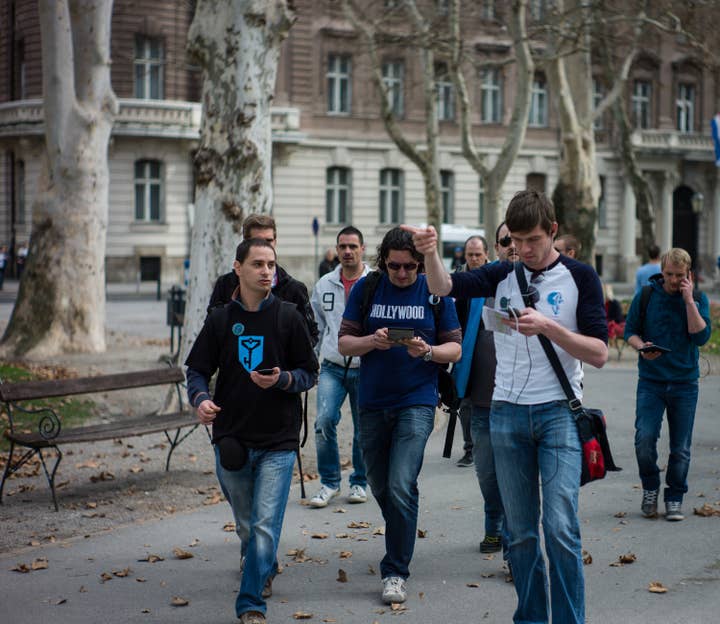How Google's Niantic Labs took over the world
Turning Google Maps into global exploration game Ingress
At first all developers wanted you to do was pick up a controller, click a mouse, waggle a joystick. Later they wanted you to dance or exercise. Niantic Labs, the game studio startup housed within Google, is the reason people are flying to Alaska.
"We just started from a core principle that we think that there is the opportunity to build a fun game that gets you out moving in the real world," says Brandon Badger, product manager of Niantic Labs.
Ingress is a mobile game that maps portals over real world locations. Players hack the portals for by walking to the location of the portals in the real world. On top of that simple gameplay is a sophisticated network of social networking, storytelling and real-world events and meet-ups.

"In fact, our graphics are really basic, and our gameplay is very basic. The fun is 'oh, it was fun to meet my new group of friends." And then, it's also very sticky. This idea of, 'I'm bored of this mobile game, so I'm not going to play anymore.' Well, with Ingress, a lot of these people it's their social community now. You don't just get bored of your friends."
The Google studio has the advantage of its own social network to organize and communicate with players and in turn players have begun to organize their own events and meet-ups around the world. Someone even found a pilot to fly them to a remote part of Alaska to capture a particularly tricky portal. Niantic supports these efforts with promotional materials like tshirts and YouTube series The Ingress Report that relays the game progress and important events to players directly.
And this adaptation to the community isn't just external, Badger explains how the infrastructure of Niantic allows for agility.
"The way that we've structured out engineering processes help us be more adaptable to the things that we're seeing in the player community and such. So, for example, we have a very agile engineering practices, where, we try to scope out the engineering tasks into smaller chunks that can be done in smaller amounts of time."

Instead of following the path of traditional software companies with plans that stretch years into the future Niantic makes sure its developers are able to make very quick changes to the game to react to the real world.
"We're a very agile system for the actual building of the product, and the consequence of that is, because we've broken the development into these smaller chunks, it does allow us to get feedback from players, and be constantly reevaluating what our priorities should be. So, we have a queue of what we think are the next 30 game features that we should do. Maybe we're working on two or three at a time, but, if something comes up, we're able to switch around the order of that pretty quickly without it being very disruptive to the engineers. We do try to model our development and our team structure like a startup so that we can be quick and nimble."
"We do try to model our development and our team structure like a startup"
Considering Google is such an internet titan, it's impressive that Niantic has managed to leverage the best of both worlds: freedom of action and access to Google's existing products and services. But that was the idea when it all started in 2010. At that point Google's head of geo John Hanke decided he wanted to create a startup, but the Google overlords convinced him to stay and create a startup inside the company. Four years later, Niantic has created a tour guide app called Field Trip and Ingress.
Ingress is now available on Android and iOs and is free, but Niantic is experimenting with a system of monetization that makes the most of its players' mobile game play. When was the last time you were in the drug store and didn't pick up a soda or some gum?
"We've taken the same approach to brainstorming ways to monetize as we've taken the approach to building the game, in that, we really want to start in a lot of ways from scratch," explains Badger.

"One of the nice characteristics of a geo game like Ingress is that people are moving through the real world, and, obviously, driving potential customers to real world businesses and service locations is something that businesses value. We're pretty optimistic that there's some model there where it can work to be a win for advertisers, Niantic Labs, and players, because, it's something that, it should add to the gameplay and not detract from the fun of the game. So, it should feel organic.
Niantic has already made all of the Duane Reade pharmacies in New York locations in the game, and, its monitoring and experimenting with different ways to integrate that into the game.
"I think that, we hope to end up with a model where, potentially there could be a cost-per-visit type model where large brands and small brands, as well, could sponsor different elements of the game, with the end of interacting with players and really tapping into that enthusiasm of players."
So what's the future of this type of this type of gaming? Well you should prepare to see a lot more of it, the plans is for Google to eventually release the tech into the wild for other developers to use.
"We're looking for partners, game developers who are interested in working with us"
"We're looking for partners, game developers who are interested in working with us to develop software and games, but also, partners from the story world and intellectual property who are interested in adopting their stories to games like Ingress," says Badger.
"We're looking for trusted partners, that, yeah, it's the right team, the technical skills, the right chemistry and team fit that can work well with our engineers and our product designers. So we go from there, and that gets us further along in developing the platform. And then you can branch out to a wider audience of partners at that point, once the platform has matured."
Niantic is also working on a new title, Endgame, with author James Frey. The game will expand the universe of his young adult novels to the real world.
"We intend to model the game in many ways on Ingress, in terms of it being social and involving meeting up in the real world, and having events where hundreds of players gather together to play," Hanke told Hollywood Reporter.









